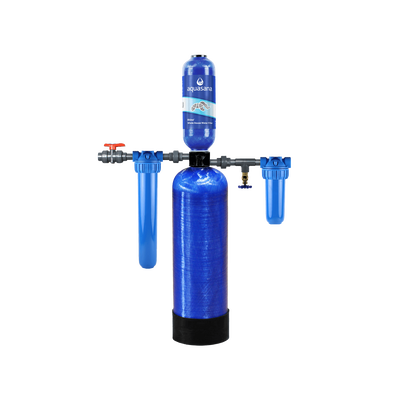1. Stains and spots on dishes and glassware
Hard water contains dissolved minerals and metals that can leave behind stains on your dishes after it dries. You may have noticed white spots on your glassware or scaly deposits around your faucets. These are examples of what’s left behind by hard water. If you’re worried about hard water ruining your dishware, then consider a water softener to help keep your dishes shiny and spot-free.
Tip: For a short-term fix, use white vinegar to remove tough hard water stains from your dishware and faucet. Spray it on, let it sit for a few minutes, and then rinse and wipe with a soft cloth.
2. Soap scum and film residue
Hard water can also leave buildup in your sinks and shower. When hard water and soap interact in the same place, they can leave behind a stubborn, white film of scum. It is ugly to look at and takes a lot of elbow grease to get rid of. Not only is soap scum a pain to clean, but it can also damage your fixtures if left alone for too long. If you’re worried about costly repairs down the road, a water softener may be a good investment.
3. Dry or itchy skin and hair
According to a study led by King’s College London, hard water exposure has been linked to eczema in infants and children while another study by UK Biobank found similar results for adults. Hard water has chemicals found in soap that can aggravate and inflame your skin and scalp. This can lead to your hair feeling more dry and itchy even after taking a shower.
The minerals in hard water also affect the pH balance of your skin. Harsh minerals can weaken the barrier of your skin that protects you against harmful bacteria and infections. If you have sensitive skin or eczema, this can make you more vulnerable to irritation and inflammation. If you’ve noticed problems with your skin and hair being dry and itchy, it can indicate you have hard water and should consider getting a water softener for your home.
4. Faded or damaged laundry
If your laundry is dull or scratchy, it might be another sign of hard water. Hard water makes laundry detergent less effective because of the reaction of minerals and detergent molecules. Hard water minerals also leave behind yellow or brown stains, causing discoloration over time. By installing a water softener, you can prevent stains and improve the vibrancy of your clothes.

5. Low water pressure
Over time, your pipes can develop a buildup of mineral deposits from your hard water. In extreme cases, this buildup can clog your pipes and slow water flow, leading to low water pressure. If pipes get too clogged, it can even lead to pipe bursts. If you feel like your home is suffering from low water pressure, this might be a sign that you have high amounts of hard water. A water softener removes water to prevent scale buildup in pipes, ensuring your water flows freely and your pressure remains good.
6. Higher utility bills
Hard water can lead to higher utility bills for a few reasons. For one, it reduces appliance efficiency which means they have to work harder and use more energy. Water heaters are commonly brought up as an example of this, as they can lose efficiency and performance because minerals build up within the tank that creates a barrier of scale between the water and heating elements. Scale is a poor conductor of heat, so it takes more energy to heat up water. The same thing happens when scale builds up in your pipes, meaning water loses additional heat as it travels throughout your plumbing. You may find that after turning on hot water, it takes several minutes for you to get warm water. A water softener could save you money by preventing scale buildup that leads to increased energy use.
7. Appliance breakdowns
Have you noticed your appliances breaking down unexpectedly? Or is their lifespan ending sooner than you expected? Once again hard water is likely your culprit. Hard water minerals create buildup in appliances that use water, requiring them to work harder which can shorten their lifespan in addition to causing leaks and corrosion. If you’re finding appliances breaking down more often than you’d expect, it could be because you have hard water. If you want to extend the life of your appliances, try a water softener to protect them from harsh minerals.
8. Chalky taste
If you don’t like the taste of your tap water, it might be because you have hard water. Hard water has high traces of minerals that taste chalky. Usually, it will also leave behind an unpleasant metallic taste. A water softener can remove these minerals from your water so it’s more enjoyable to drink.
Did any of these signs look familiar? If you said yes, it may be time to consider protecting your home with a water softener. Aquasana’s SimplySoft® Grain Softener is available in a 40k and 60k capacity to suit homes of all sizes, and is IAPMO certified to NSF/ANSI Standard 44 for the reduction of water hardness. Our softener also uses 50% less salt and generates 28% less wastewater than conventional softeners*, making it more eco-friendly. Contact one of our Water Experts today to learn more and choose the best option for your home.
* Potential savings based on Water Quality Research Foundation Battelle Institute Study.
WHOLE HOUSE WATER SOFTENER
SimplySoft® 40,000 Grain Softener
Reduces minerals that cause hard water, providing softer, scale-free water from every tap in your home.
.png)


